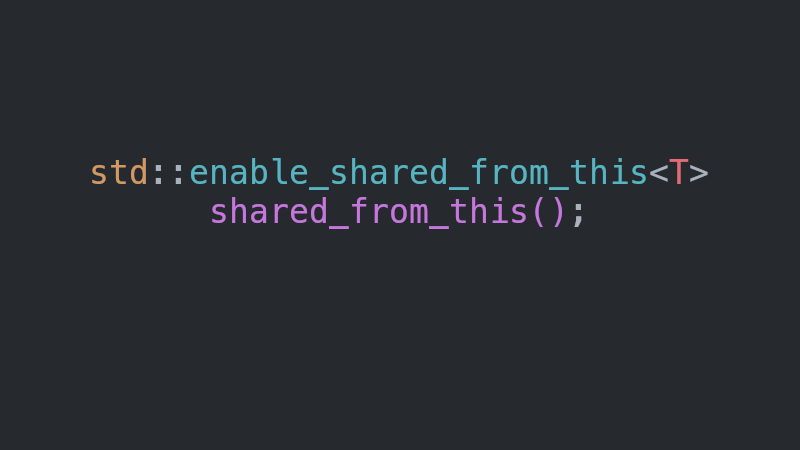
std::enable_shared_from_this is a C++ functionality, added since C++11, that allows a class to create shared instances shared_ptr of itself.
This mechanism is useful when you need to create a shared_ptr inside a method of the class itself, especially to avoid duplication and maintain the correct reference count.
Usage
First of all, your class needs to inherit publicly(std::enable_shared_from_this<T>) for your class type, example:
class MyClass : public std::enable_shared_from_this<MyClass> {The member function of this class that has return type: shared_ptr will no longer return *this but instead shared_from_this(), example:
- The use of
*thisis not appropriate, because it does not increment the reference count ofshared_ptr; - The use of
*thiscan lead to memory management problems and possible dangling pointers (or wild pointers, which do not point to appropriate locations); - The use of
*thisis only appropriate for raw pointers and references.
// Bad idea
std::shared_ptr<MyClass> set_info() {
return *this;
}
// Good idea
std::shared_ptr<MyClass> set_info() {
return shared_from_this();
}Examples
Let’s say you have this code that adds and increments members of a class, as we saw in this video:
#include <iostream>
template<class T>
class Vector2 {
public:
T x, y;
Vector2(T xin, T yin) : x(xin), y(yin){}
Vector2 operator + (const Vector2& rhs){
return Vector2(x + rhs.x, y + rhs.y);
}
Vector2 & increment(int number){
x += number;
y += number;
return *this;
}
void print(){
std::cout << x << " and " << y << '\n';
}
};
int main (){ Vector2 v1(1, 2), v2(3, 4);
Vector2 v3 = v1 + v2;
std::cout << "v3.x: " << v3.x << '\n'; // 4
std::cout << "v3.y: " << v3.y << '\n'; // 6
// Or just:
v3.print(); // 4 and 6
v3.increment(5);
v3.print(); // 9 and 11 return 0;
}Note that the Vector2 class has a member function: increment which is a reference to itself and returns a *this!
Translating this code to use std::enable_shared_from_this, it would look like this:
#include <iostream>
#include <memory>
template<class T>
class Vector2 : public std::enable_shared_from_this<Vector2<T>> {
public:
T x, y;
Vector2(T xin, T yin) : x(xin), y(yin) {}
Vector2 operator + (const Vector2& rhs) {
return Vector2(x + rhs.x, y + rhs.y);
}
std::shared_ptr<Vector2> increment(int number) {
x += number;
y += number;
return this->shared_from_this();
}
void print() {
std::cout << x << " and " << y << '\n';
}
};
int main() { auto v1 = std::make_shared<Vector2<int>>(1, 2);
auto v2 = std::make_shared<Vector2<int>>(3, 4);
Vector2<int> v3 = *v1 + *v2;
std::cout << "v3.x: " << v3.x << '\n'; // 4
std::cout << "v3.y: " << v3.y << '\n'; // 6
// Or just: v3.print(); // 4 and 6
auto v3_ptr = std::make_shared<Vector2<int>>(v3);
v3_ptr->increment(5);
v3_ptr->print(); // 9 and 11
return 0;
}Note that we inherited publicly: std::enable_shared_from_this and the type of increment is now std::shared_ptr and returns: shared_from_this().
From this code we have automatic reference management and we can even count them, example:
std::cout << "Number of references (how many times we instantiate/create object/pointer) for v1: "
<< v1.use_count() << '\n'; // 1
std::cout << "Number of references (how many times we instantiate/create object/pointer) for v2: "
<< v2.use_count() << '\n'; // 1
std::cout << "Number of references (how many times we instantiate/create an object/pointer) for v3_ptr: "
<< v3_ptr.use_count() << '\n'; // 1Much more modern and like a boss!
For more information, check out the links below!
Useful links
- https://en.cppreference.com/w/cpp/memory/enable_shared_from_this
- https://embeddedartistry.com/blog/2017/01/11/stdshared_ptr-and-shared_from_this/
- https://en.wikipedia.org/wiki/Dangling_pointer
- https://stackoverflow.com/questions/18565167/non-const-lvalue-references-cannot-be-bound-to-an-lvalue-of-different-type
- https://www.google.com/search?q=%E2%96%A0+Non-const+lvalue+reference+to+type+cannot+bind+to+a+temporary+of+type+%27shared_ptr%3CT%3E%27




